
Apamea is a genus of moths in the family Noctuidae first described by Ferdinand Ochsenheimer in 1816.

Chytolita is a monotypic litter moth genus of the family Erebidae erected by Augustus Radcliffe Grote in 1873. Its only species, Chytolita morbidalis, the morbid owlet moth or morbid owlet, was first described by Achille Guenée in 1854. It is found in large parts of North America, from coast to coast in the north and south to North Carolina, Texas and Florida in the west. The habitat consists of deciduous woods and edges.
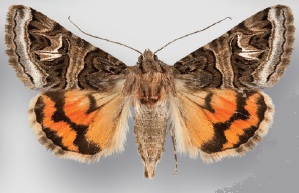
Drasteria is a genus of moths in the family Erebidae.
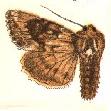
Apamea centralis is a moth of the family Noctuidae first described by Smith in 1891. It is native to North America, where its range extends from California to Alberta.
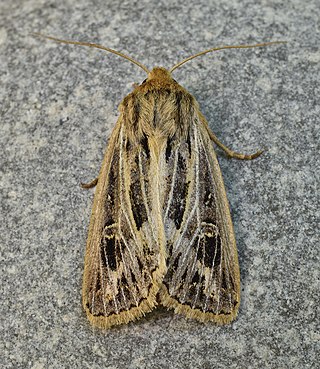
Apamea niveivenosa, the snowy-veined apamea, is a moth of the family Noctuidae. The species was first described by Augustus Radcliffe Grote in 1879. It is native to northern North America, where it can be found across Canada and south to California.

Apamea plutonia, the dusky Quaker or dusky apamea, is a moth of the family Noctuidae. The species was first described by Augustus Radcliffe Grote in 1883. It is native to northern North America, where it occurs across the boreal regions, with some occurrences from as far south as New Mexico and Pennsylvania.

Apamea apamiformis, known by the common names rice worm moth, riceworm, and wild rice worm, is a moth of the family Noctuidae. It is found in North America, including Wisconsin, New York, Minnesota and eastern Canada, with imperiled or critically imperiled populations in Maryland and Indiana, respectively, and a vulnerable population in New Jersey.
Xestia laxa is a species of cutworm or dart moth in the family Noctuidae. It was described by J. Donald Lafontaine and Kauri Mikkola in 1998 and is found in North America.
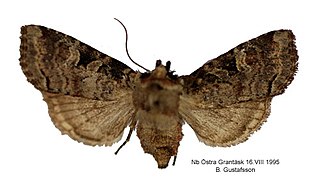
Hillia iris, the iris rover, is a species of cutworm or dart moth in the family Noctuidae. It was described by Johan Wilhelm Zetterstedt in 1839 and is found in North America.
Perigonica pectinata is a species of cutworm or dart moth in the family Noctuidae. It was described by Smith in 1943 and is found in North America.
Chaetaglaea fergusoni, or Ferguson's sallow moth, is a moth in the family Noctuidae. It was described by Vernon Antoine Brou Jr. in 1997 and is found in North America.
Homorthodes dubia is a species of cutworm or dart moth in the family Noctuidae. It was described by William Barnes and James Halliday McDunnough in 1912 and is found in North America.

Tesagrotis corrodera is a species of cutworm or dart moth in the family Noctuidae. It was described by Smith in 1907 and is found in North America.
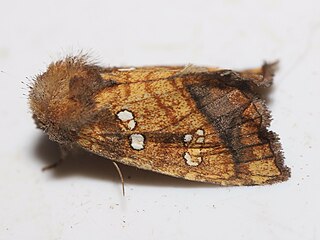
Papaipema pterisii, the bracken borer moth, is a species of cutworm or dart moth in the family Noctuidae. It is found in North America.

Lithophane grotei, commonly known as Grote's pinion or Grote's sallow, is a species of moth in the family Noctuidae. It was first described by Riley in 1882 and it is found in North America.
Brachylomia sierra is a moth in the family Noctuidae, native to North America. The species was first described by James T. Troubridge and J. Donald Lafontaine in 2007.
Neleucania patricia is a species of cutworm or dart moth in the family Noctuidae. It is found in North America.

Lacinipolia triplehorni is a species of cutworm in the family Noctuidae. It is found in North America.

Tricholita chipeta is a species of cutworm or dart moth in the family Noctuidae. It was first described by William Barnes in 1904 and it is found in North America.

Apamea quinteri is a species of cutworm or dart moth in the family Noctuidae. It is found in North America.











